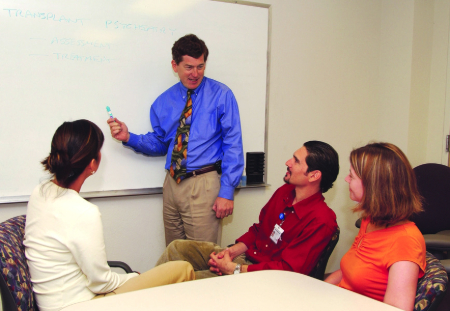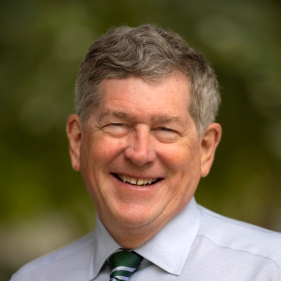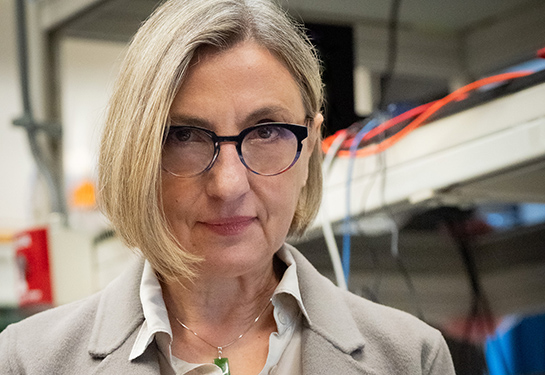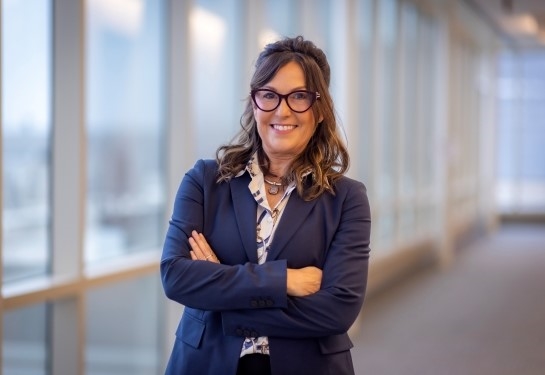Lessons in medical education: Preparing better doctors for a changing world
Longtime School of Medicine vice dean reflects on the transformation of the learning environment
In recent years, medical school education has shifted from a traditional lecture-based model to a more dynamic, student-centered approach. The transformation has put a greater emphasis on early clinical exposure, critical thinking and hands-on learning.
Looking ahead, the integration of AI, virtual reality and personalized learning tools is poised to further redefine how future physicians are trained — making education more adaptive, immersive, and globally connected.
To better understand this evolution, we spoke with Mark E. Servis, who has been a faculty member in the Department of Psychiatry and Behavioral Sciences since 1989. Servis, a psychiatrist, retired this summer and was granted emeritus status but will continue to serve in the UC Davis School of Medicine as vice dean for medical education through June 2027.
How has UC Davis evolved as a medical school throughout your tenure?
During my 36-year tenure, I’ve watched the UC Davis School of Medicine evolve from being seen as an afterthought to becoming a nationally respected leader in medical education. That transformation is rooted in a strong, sustained commitment from both faculty and leadership to prioritize teaching — something many institutions still lack.
At UC Davis, education truly feels like a priority. Unlike many top research institutions where teaching often takes a back seat, here it's front and center. The faculty are deeply invested in education — many consider it their first passion, even above research. I love the mantra that patients come first and that starts with great teaching. Our faculty embodies that, committing to education at a level rarely seen elsewhere.
How is the UC Davis School of Medicine different from other medical schools?
Primary care has always been central to the UC Davis School of Medicine. Founded with a mission to train primary care physicians, we've evolved into a prestigious tertiary care center. Yet, we remain a national leader in primary care education — consistently ranked among the top by U.S. News & World Report. No major medical research school surpasses us in the percentage of graduates entering primary care.
Our national reputation is also built on our pathway programs — like REACH, Tribal Health PRIME, Rural PRIME, and ACE-PC — which are designed to prepare students to serve in the most underserved areas. These programs are a cornerstone of our identity and impact.
Within the UC system, I’d argue UC Davis leads in addressing California’s physician workforce needs more effectively than any other campus.
“Within the UC system, I’d argue UC Davis leads in addressing California’s physician workforce needs more effectively than any other campus.” —Mark Servis
How is AI changing medical education?
AI is poised to transform education — and fast. Within five years, traditional lecture-based teaching may be obsolete, as generative AI will likely deliver content more effectively than even the best human instructors. While AI may not “understand” what it teaches, its ability to convey knowledge efficiently is unmatched.
But teaching is more than content delivery. As Parker Palmer wrote in The Courage to Teach, it's about the identity and integrity of the teacher — the relationship between teacher and learner. That relational aspect, especially in medicine, remains irreplaceable. Clinical rotations, small group learning and the development of professionalism, teamwork, and interpersonal skills are all deeply human and cannot be outsourced to AI.
The challenge ahead is guiding faculty and students to focus not just on knowledge acquisition and test performance, but on these essential, human-centered aspects of learning. This is especially critical in medicine, where AI will also reshape clinical practice. Physicians must understand how AI reaches its conclusions — otherwise, we risk reducing their role to that of passive intermediaries.
How can medical schools ensure future doctors maintain core competencies in an era of increasing reliance on AI and digital tools?
We must ensure future doctors retain critical thinking and core clinical skills — skills that still matter when the power goes out. I’ve seen this firsthand: during a power outage in our clinic, residents were paralyzed without the Electronic Medical Record. But medicine existed long before digital records and we must preserve that foundational competence.
At the UC Davis School of Medicine, we’re taking this seriously. I’m part of a strategic planning group launched by the dean’s office to address AI’s impact on education and practice. We’re exploring safeguards, best practices and leadership opportunities in this space. While AI presents real risks, it also offers tremendous potential — and as an academic institution, we must lead the way in shaping its future.
What are some key trends that you're seeing in medical education?
Competency-based education (CBE) has been another major shift in medical education over the past five years. Traditionally, we’ve measured readiness through time — you need four years of medical school, then three years of residency to be a family medicine doctor or seven years to be a neurosurgeon. It's all time based, but time is a blunt tool. Learners progress at different rates and education should reflect that.

CBE focuses on assessing whether students have truly mastered the required competencies, regardless of how long it takes. This model allows for more personalized, efficient learning. Our ACE-PC program is a prime example —a n accelerated, three-year, competency-based track in primary care that’s proven highly successful.
UC Davis School of Medicine has been a national leader in this space. Our early adoption of CBE, supported by an American Medical Association grant over 15 years ago, positioned us at the forefront of innovation. We've published widely, influenced national models, and helped define what modern medical education can look like.
What leadership qualities do you hope to see in the next generation of physicians, and how can UC Davis help cultivate these attributes?
Leadership in medicine is evolving, and the qualities we need in future physicians are shifting with it. I’m a strong believer in the servant leadership model — one that emphasizes relationships over hierarchy, empowerment over authority. Fortunately, younger generations naturally lean this way. They question traditional power structures and are more inclined to lead through collaboration and empathy.
Servant leaders empower their teams, build consensus, secure resources and help others succeed. These are the kinds of leaders we need in health care — those who uplift patients, colleagues and communities. At UC Davis, our collaborative, non-hierarchical culture already supports this model. In fact, leaders who come from more top-down environments often struggle here, because our community expects a more relational, inclusive approach.
While there’s a place for more directive leadership in moments of disruption or transformation, long-term success in academic medicine depends on trust, shared vision and empowerment. UC Davis is well-positioned to cultivate these qualities in future physicians, thanks to the culture we’ve built and the values we uphold.
How can medical schools adapt their education and training to prepare future physicians to meet the evolving needs of diverse communities?
At UC Davis, we’ve reimagined admissions to prioritize the qualities future physicians truly need. We use the Multiple Mini Interview (MMI) format, which is more reliable than traditional interviews and specifically designed to assess traits like resilience, adaptability, teamwork and conflict resolution. These are essential in today’s health care environment — where medicine is high-stress, constantly evolving and increasingly team-based.
The MMI functions as a series of situational judgment tests, often using standardized actors to simulate real-world challenges. While academic metrics like GPA and MCAT scores still matter, they’re no longer the sole focus. At UC Davis, we place greater emphasis on the personal qualities that predict success in medicine.
We’re also a national leader in holistic admissions. The Davis Scale, for example, helps us assess “distance traveled,” the journey an applicant has taken to reach this point, often overcoming socioeconomic or personal obstacles. Those who’ve navigated such challenges often bring the resilience and perspective we value most. Through this approach, we’re selecting not just high achievers, but future physicians who reflect and can serve the diverse communities of California.




